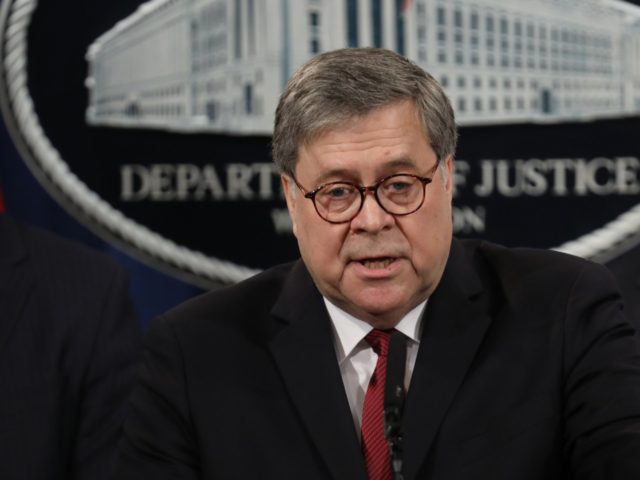WASHINGTON, DC – President Donald Trump never asserted executive privilege to block any public disclosures, Attorney General William Barr said in Thursday’s much-anticipated press conference on the report of Special Counsel Robert Mueller, and Barr is redacting only the parts required by law.
Barr briefed reporters and the public on the full scope of Mueller’s investigation and report. Under federal regulations found at 28 C.F.R. § 600.8, a special counsel makes a confidential report to the attorney general on all of the prosecutor’s work and conclusion. It is not a public document and Mueller submits nothing to Congress. Then under 28 C.F.R. § 600.9(c), the attorney general has discretion – but is not required – to determine if disclosure of any of that material is in the public interest, and if so the attorney general is permitted to release parts to the public.
Understanding the extraordinary public interest in this matter, Barr decided to release the entire Mueller Report, with Barr redacting on the portions required by law. He is also delivering the report to Congress, in addition to his own summary.
The attorney general made explicitly clear that President Trump never asserted executive privilege, which would have blocked parts of the report from public disclosure.
There are two types of executive privilege. The first is the presidential communications privilege, which pertains to conversations or other communications personally involving the president, either with White House staff or with other senior administration officials. The second is the deliberative process privilege, a lesser and weaker form of privilege which involves deliberations of anyone in the executive branch discussing sensitive matters.
For both forms of privilege – including the second one, which by definition covers communications where the president was not personally involved – only the president can assert privilege. (The Supreme Court recognized in Cheney v. U.S. District Court that sometimes the vice president can assert executive privilege and in United States v. Nixon that former presidents can assert it, but neither of those rare exceptions are relevant here.)
Not only did President Trump never assert executive privilege here, he did not even request an advance copy of the report to consider whether to assert privilege over any part of it. The president decided to be fully transparent on the report without knowing what was in it.
The only redactions in the report were made by Barr, in consultation with senior staff at the U.S. Department of Justice (DOJ) and the intelligence community. He did not consult with the White House.
Barr redacted four categories of material. Certain redactions are required by federal law.
The first category is material presented to a federal grand jury. Federal law requires grand jury testimony to remain confidential. Barr has no discretion to allow such testimony to be made public.
The second category is material that would reveal sources or methods of intelligence gathering. Most such matters are classified, and therefore are required by law to be secret. (Federal statute defines classified material as information that would damage the national security of the United States if it became public.) Although it is possible for some aspects of sources and methods not to be classified, such as if activities involving only domestic DOJ operations instead of foreign affairs and intelligence agencies such as the CIA or NSA, such materials would impair law enforcement efforts if publicly disclosed.
The third category is related: material that would impair ongoing DOJ investigations or pending court cases. Disclosing material from current prosecutions could cost DOJ a conviction that they are pursuing, resulting in a guilty person being acquitted.
The final category is material that involves the privacy or reputations of innocent third parties. When you have hundreds of subpoenas and interviews of a wide range of individuals, effective investigators uncover material that is deeply embarrassing regarding the personal and professional conduct of individuals. Many people engage in conduct of a nature that people do not publicly discuss – one hypothetical example would be marital infidelity – that are not criminal acts, and that prosecutors would see no justification for revealing publicly.
Those are the only four categories of redactions. Everything else in the report will be publicly released, and each redaction will specify which of the four categories it falls within. Key congressional leaders will receive a copy of the report with even fewer redactions.
Barr also made clear that President Trump did not request any redactions, nor did White House staff, the president’s personal attorneys, or anyone else outside DOJ.
In the end, almost all of the long-anticipated Mueller Report is becoming public. With no prosecutions coming from it, the consequences for good or ill will be political, not legal. Instant reactions from the White House indicate that the president’s team are confident that the political implications will be as positive for President Trump as the legal outcome.
Ken Klukowski is senior legal analyst for Breitbart News. Follow him on Twitter @kenklukowski.

COMMENTS
Please let us know if you're having issues with commenting.